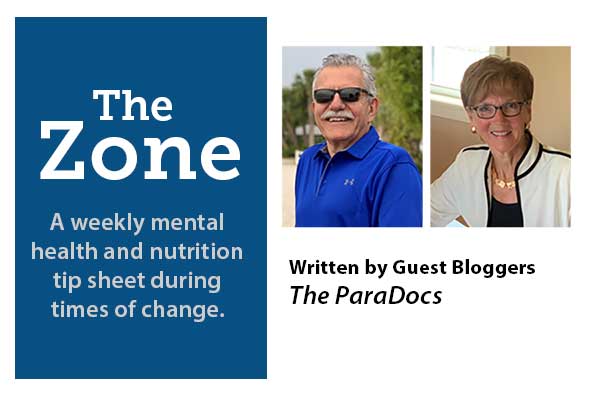With our lifestyles being more stationary than they were pre-pandemic, many of us have lost the motivation to move. How can we incorporate more natural movement into our days?
In Volume 50 of this guest series, psychotherapist Dr. Francis L. Battisti and nutritionist Dr. Helen Battisti explain how incorporating more natural movement into your day can improve overall health.
For over 10 years, they have worked closely with us on aging concerns and have presented many webinars and in-person workshops. Their newsletter, The Zone, is a weekly mental health and nutrition tip sheet during times of change.
Continuing the discussion on self-care, this week we will focus on the applications of the initial demographic research on longevity by Gianni Pes and Michel Poulain, commonly known as the Blue Zones.
The Blue Zones are five geographic areas of the world where inhabitants live well into their 80’s, 90’s, and 100’s, and are still active and engaged with their life. The outcomes from this research have identified nine common lifestyle characteristics of these healthy centenarians. These individuals and their practices, because of their successful health and longevity, have much experience that we can learn from. They have experienced major events such as wars, famines, pandemics and have not only survived but continue to still live well. Let us explore what the researchers have found and how we can integrate them, if we so choose, in our daily life.
The nine lessons learned include: Move Naturally, Purpose, Down Shift, 80% Rule, Plant Slant, Wine at 5:00, Belong, Loved Ones First, and Right Tribe.
As the world continues to open, it offers new and expanded opportunities to practice the first lesson of Move Naturally. Some of us are most likely already moving naturally. The research has defined Move Naturally as the process of moving naturally throughout the day – walking, gardening, doing housework and other similar daily activities. These core activities underscore how movement is a natural function of the human body and how essential it is to good mental and physical health. While the current recommendation to walk 10,000 steps daily can be accomplished at the gym, Move Naturally is inherent in one’s daily routines. Ways that we might increase our natural movement can include, at work, rather than sending a text or emailing a colleague, walk to their office, or park as far away from the entrance to your location as possible. Maybe walk to lunch, have walking meetings and, when safe, return to walking and shopping. In Okinawa, the centenarians regularly sit on the floor to read, eat, talk, and relax. The sitting and getting up from the floor throughout the day exercises their legs, back and core in a natural way. It also improves posture, flexibility, mobility, and strength.
Re-engaging with our bodies through natural movement is a key component of our self-care regime that enhances our well-being in so many ways.
Key Takeaways
- We have much to learn from the Sages of our Time.
- Move Naturally is integral to healthy aging, which begins at birth.
- By living intentionally, we will find new ways to Move Naturally.
- Keep on Walking.
- Find and use your local Rails to Trails.
- “Dance like nobody’s watching” ~ Mark Twain
- Letting the weather be your excuse to not move.
- Thinking that using your automatic recliner is Move Naturally.
- Wearing old sneakers that have too many miles on them.
Move Naturally does not financially cost anything, however, it can save us a great deal in health-care cost of all types and it will enhance our quality of life immediately.
Quote of the Week
“Within us there is an ancestral memory of movement that longs to be reawakened. We modern humans can learn to master again the ancient biotechnology that our bodies represent.”
–Erwan LeCorre

